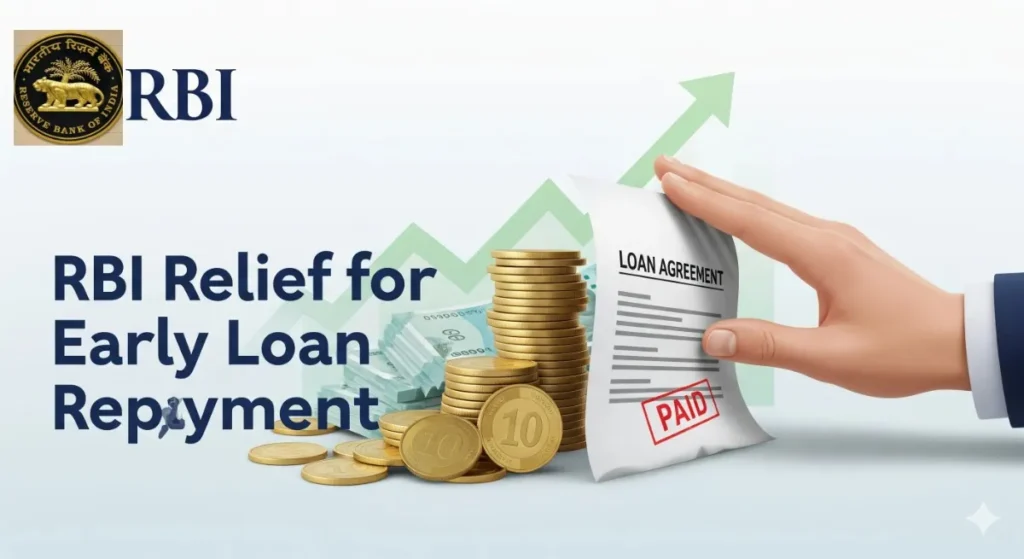
The Reserve Bank of India (RBI) has announced a major relief for borrowers, especially those who want to close their loans earlier than the agreed tenure. Starting January 1, 2026, no additional charges or penalties will be imposed on the prepayment of floating rate loans, including popular products like home loans. This new rule will apply to both banks and non-banking financial companies (NBFCs).
This decision of RBI relief for early loan repayment brings long-awaited relief for borrowers who often felt stuck paying high interest rates due to prepayment penalties. With this move, customers will have more freedom to manage their loans smartly and reduce their financial burden.
What Does Prepayment Mean?
Prepayment simply means paying off a loan, either partially or fully, before the scheduled time. Until now, many banks and NBFCs charged borrowers a prepayment penalty whenever they tried to repay the loan early.
For example, if a borrower wanted to close a home loan or switch to a lender offering a lower interest rate, these penalties acted as a barrier. As a result, people ended up paying more interest than necessary. The RBI relief for early loan repayment directly removes this hurdle, making borrowing cheaper and more flexible.
Who Will Benefit the Most?
The RBI’s new guidelines will benefit a wide range of borrowers:
- Individuals with floating rate loans (like home loans, education loans, or personal loans for non-commercial purposes).
- Loans taken jointly with co-borrowers will also qualify for this benefit.
- Micro and small entrepreneurs who have taken floating rate loans for business purposes.
This ensures that both salaried individuals and small business owners will enjoy the same freedom when repaying their loans early.
Which Institutions Are Covered?
The relief is not limited to big banks. Even if you have borrowed from:
- Small Finance Banks
- Regional Rural Banks (RRBs)
- Local Area Banks
- Tier-4 Urban Cooperative Banks
- NBFCs
- All India Financial Institutions
…you will still enjoy this benefit, as long as your loan amount is up to ₹50 lakh. In such cases, no prepayment charge can be imposed.
No Restriction on Source of Prepayment
Another major highlight of this RBI decision is that the source of money for repayment does not matter. Whether the borrower uses their savings account or transfers the loan to another bank, the lender cannot levy a penalty.
Additionally, there will be no lock-in period for these loans. Borrowers will have the complete freedom to repay whenever they wish.
What About Fixed Term Loans and Overdrafts?
- For fixed-term loans, if a lender charges prepayment fees, it must only be calculated on the exact amount repaid and not on the full loan.
- For overdraft or cash credit facilities, if the borrower informs the bank in advance about closing the account and does not renew it, no charges will be applicable.
The RBI has also directed that all terms regarding prepayment must be clearly mentioned in the Key Fact Statement (KFS). If not stated upfront, lenders cannot later impose hidden charges.
What Will Change for Customers?
From January 1, 2026, customers will see the following benefits under RBI’s new policy:
- Zero penalty on early repayment of floating rate loans.
- Freedom to switch to cheaper interest rate options without financial barriers.
- No forced restrictions by banks or NBFCs.
- Greater protection of borrower rights and transparent loan transactions.
Final Thoughts
The RBI relief for early loan repayment is a welcome move that empowers borrowers. With this rule, customers will save money, reduce their loan burden faster, and gain the confidence to explore better loan options without worrying about extra costs.
This step by the Reserve Bank of India not only promotes fairness but also strengthens trust between lenders and borrowers. From 2026 onwards, prepayment will no longer be a financial penalty but a true financial freedom.

